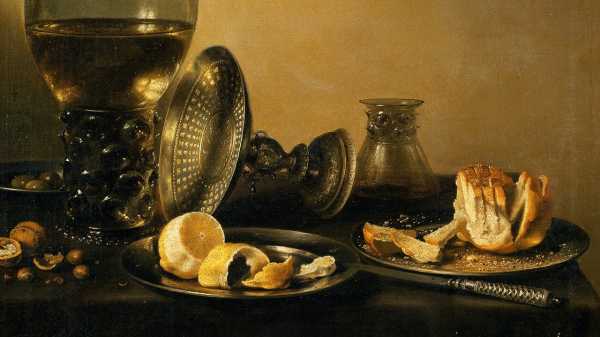
The concept of the new podcast “Everything Is Alive”—interviews with inanimate objects—annoyed me when I first heard it, just as well-intentioned elementary-school creative-writing assignments did. (“Imagine a day in the life of a pencil!”) Knowing nothing of its creator and host, Ian Chillag, I feared something twee. But, when I listened to it, I found myself laughing often, transported by delight. Much of the time, its tone is just right, its unscripted dialogue casually engaging and intelligent. In each episode, Chillag, a former producer of “Wait Wait . . . Don’t Tell Me!” and other NPR fare, interviews a performer in the role of the object: Louis, Can of Cola (Louis Kornfeld), or Maeve, Lamppost (Maeve Higgins), or Tara, Bar of Soap (Tara Clancy). It’s a bit like “Dr. Katz, Professional Therapist,” if the patient were Dr. Katz’s couch. Chillag gets his subjects to open up and show us their point of view, whether it’s from a shower’s soap dish or a queen-size bed. After spending much of the year listening to podcasts about politics and injustice—most of them wonderful, all of them intense—I discovered that I quite enjoyed spending a few minutes imagining the life of a pillow.
Here’s the beginning of Episode 1, when Chillag invites Louis, Can of Cola, to tell us about himself. Louis is a can of a bargain brand, Go2 Cola, from Safeway. “I was bought in a case,” Louis says. “So there were twenty-four of us. We were all purchased together. And, actually, our next residence was a bowling alley, for a twelve-year-old’s birthday party.” (Just the kind of occasion for which one might purchase an off-brand, utilitarian soda, I thought.) Most of Louis’s peers were consumed at the party; he was not. “I was saved for later and brought home and put into a refrigerator and then forgotten about for a few months—placed in the back of the fridge,” he says. This had me contemplating the stray bottles of beer and champagne that lurk in the depths of my own refrigerator after a party, looking forlorn, waiting for another party to come. “I froze in the fridge,” Louis goes on. “I didn’t freeze all the way through, but I had a frozen couple of weeks.”
“You were slushy inside?” Chillag asks.
“I was slushy inside. Yeah.” He was taken on a road trip to Florida—even made it to the front-seat cup holder. “And they never got around to drinking me on that trip, and they put me back in the fridge, and that’s where I’ve been ever since.”
“It sounds like you were almost chosen so many times,” Chillag says.
Louis laughs, ruefully. “Yeah,” he says. “Yeah.”
Louis is the thoughtful soul of a generic product—Go2 Cola is neither wholesome nor satisfyingly desirable in the way of an élite junk food. He is a bottom-shelf, somewhat anonymous thing, the likes of which are abundant in our lives, little thought about or appreciated. His self-awareness and self-acceptance are touching; we might empathize with him a bit, or understand feelings of being a Go2 in a Coke-and-Pepsi world, and then laugh at ourselves, with a kind of meta amusement, as we realize that podcasts, those efficient empathy instigators, can officially make us empathize with anything.
Like “Drunk History,” “Everything Is Alive” provides us with factual information—here, about the status of various sodas in other countries, or the dust-mite content of pillows, or the insidious prevalence of “body wash”—with a shift of perspective that makes it funny, and an emphasis on the pleasurable artfulness of conversational speech. Higgins portrays a confident Brooklyn lamppost with a lamp-centric world view—she’s seen “Singin’ in the Rain” through an apartment window and thinks that its star is the lamppost. Like Higgins, the lamppost interviewee has an Irish accent, but unlike Higgins she’s not well-travelled: she dreams of visiting Prospect Park Southwest, which, from her vantage on an adjacent street, is where people disappear.
It’s unclear how long “Everything Is Alive” will feel novel, and how long the show will continue to charm us once the novelty wears off. But for now it feels like a welcome change of pace from earnest documentaries, clubby comedy podcasts, and, obviously, the news. It’s made with care and understated wit, and it has a surprising frisson of seriousness, quietly provoking thoughts about the objects in our lives, these humble products unwittingly laden with our emotions. Every night, upon getting into bed, I feel things about the pillows in my life: resentment toward the one that promised to revolutionize my sleep experience but didn’t, disappointment in the one I hoped would replace my favorite old feather pillow, which I need to throw away, but which just doesn’t compare; grudging tolerance for the indented memory-foam one, which seems to think it’s much more terrific than it is. I tend to forget about these passions and frustrations until bedtime, when it all revs up again. That’s why I was so pleased to meet Dennis, Pillow (Dennis Pacheco), who understood right away. Here he is telling Chillag about his fellow-pillows on the bed where he lives:
One is this very flat sort of “over it” pillow, you know? Just flattened, and just over it. One is a little loopy because he was put in the wash, kind of got scrambled, and never was quite right again. And the third is memory foam. Which—it’s just—he’s not completely flat but he’s not ever going to get full again, either. There’s something very fake about him? He wants to be all things to all people. And you can’t be anything if you’re everything.
Later, Dennis has a hilarious, spacy riff about feathers, clouds, and angels, which ends with him wondering if God’s pillow is made from angels’ feathers. Then he realizes that he’s gotten weird. “I spend a lot of time with people dreaming, so I guess my imagination just sort of has a dream logic to it sometimes,” he says. Dream on, Dennis.
Sourse: newyorker.com






